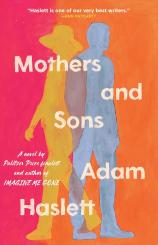Mothers and Sons
Review
Mothers and Sons
A friend of mine recommended Adam Haslett's earlier work to me, mentioning that his portrayal of depression in IMAGINE ME GONE is the most authentic one she has ever read. Haslett continues to excel at depicting complicated emotional responses in his latest novel, MOTHERS AND SONS.
The book alternates perspectives between Peter Fischer, an immigration lawyer working in New York City, and his mother Ann, a former Episcopal priest who now runs a women's retreat center in rural Vermont. Peter's sections are narrated in his first-person voice, in the present tense, while Ann's are in past tense and third-person voice.
"[T]he book excels at taking some seemingly small incidents in the present day and weaving them into the fabric of a long and complicated relationship."
Peter and Ann's vocations are strikingly similar in many ways. Both rely on careful listening, respecting the stories of those who come to them for help. In Peter's case, those people are immigrants seeking representation during their asylum hearings; in Ann's, they're women coming to retreat circles for prayer and solace. It becomes clear, though, that the two have become more or less estranged, never visiting one another and communicating largely by means of their shared relationship with Peter's sister, Liz.
In their separate narratives, both mother and son are experiencing minor crises in the present day that might bear hints of what drove them apart many years earlier. Ann is wracked with guilt and inner conflict over a promise she made to Jeanette, the retreat facility's caretaker, keeping a story Jeanette shared in confidence secret, even from Ann's wife, Clare. And Peter, who is gay, has intentionally left to his colleagues all other cases of immigrants fearing reprisal due to their sexual orientation. But he reluctantly agrees to represent a young Albanian man who fears for his life if he has to return to his home country.
As Peter comes to know Vasel, the young man's traumatic story brings up vivid memories of Peter's own youth, when his first time falling in love with a boy in his high school coincided with drama at home. His father was dying even as his mother was leaving him for Clare, the woman with whom she unexpectedly had fallen in love. Peter's work with Vasel forces him to confront his own unresolved trauma, as well as contend with a still-raw tragic loss that may have permanently scarred his relationship with his mother and left him choosing loneliness over connection.
The way that Haslett weaves together Ann and Peter's stories, as well as past and present, manages to be both formally sophisticated and emotionally authentic. Without revealing too much, the novel's trajectory eventually reveals, in some powerful ways, why the title is MOTHERS AND SONS (plural rather than singular). Less successful is a subplot about Ann's colonial ancestors' brutal ways and her disregard of her family history. This component of the narrative comes off as either irrelevant or heavy-handed, depending on how it's read.
That said, the book excels at taking some seemingly small incidents in the present day and weaving them into the fabric of a long and complicated relationship. It shows that there is still room to mend the gashes in that fabric, with a little grace and a lot of listening.
Reviewed by Norah Piehl on January 11, 2025
Mothers and Sons
- Publication Date: January 7, 2025
- Genres: Fiction
- Hardcover: 336 pages
- Publisher: Little, Brown and Company
- ISBN-10: 0316574716
- ISBN-13: 9780316574716




